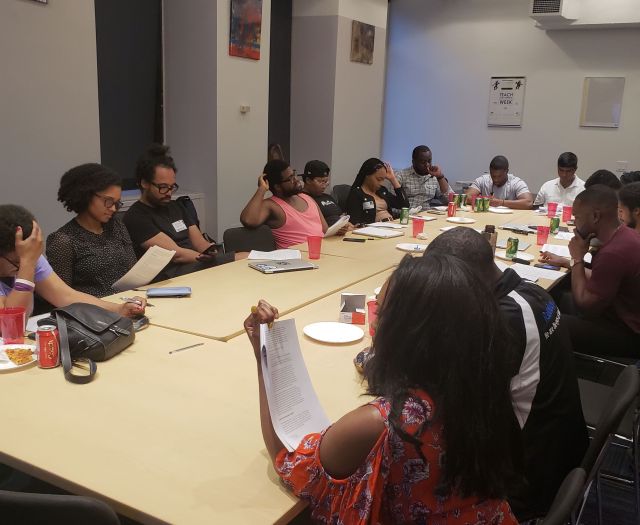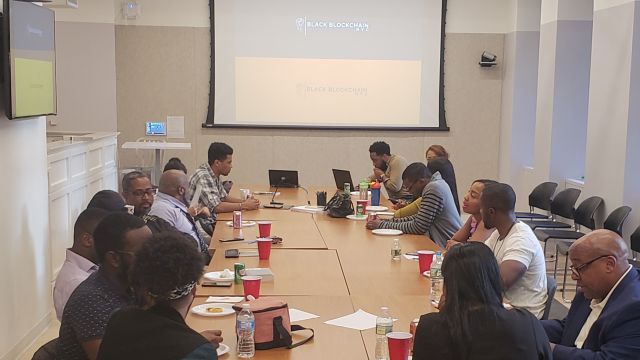It’s a Thursday night in Lower Manhattan’s Financial District. Just about everyone’s heading home for the day on the 13th floor of a high-rise that houses the Teach For America headquarters, but one meeting is just getting started. The group of about 15, mostly black people in their 20s and 30s, is just using the space, making small talk around the conference table before they get to the topic at hand—blockchain.
“The pizza’s on its way,” says Reuben Ogbonna, the lead organizer of Black Blockchain, a group that gathers monthly at the Teach for America office where he works.
Today, the class is smaller than normal because of a freak snowstorm. “Thanks for making it out today,” Ogbonna says to the members in attendance as they get started. Each meeting is led by a guest speaker and today’s session is all about regulation, led by Jason Gershenson, a lawyer with the boutique firm, White Summers Caffee & James, who’s advised a number of crypto-funded startups. He goes through the history of regulation of cryptocurrencies in the U.S. and abroad, some notable cases of companies being held liable for scams and fraud, and the differences between security and utility tokens—all topics that might make the average person’s eyes glaze over, but tonight everyone is locked in.
It’s no secret that by any popular measure, the technology industry sucks when it comes to diversity. A June report by Reveal from The Center for Investigative Reporting shows that in 177 of Silicon Valley’s biggest companies, the median percentage of black employees was 2.5 percent, and at the executive level, zero percent. And the venture capitalist industry, which most tech startups rely on, is 70 percent white, with almost no representation at all of black and Latinx women according to TechCrunch. That’s not considering the host of other issues that make it harder for women and minorities to stay in their jobs if they can even get in the door. So, many underrepresented people are left to explore alternatives—like blockchain.

Despite its utopian vision as a great equalizer, many of the issues that plague the broader tech industry, and the world in general, like racism and sexism, are also present within the blockchain space. A report published by Longhash, found that only 14.5 percent of staff members in recent blockchain startup were women. And there’s a surprising lack of information about the racial and ethnic makeup of blockchain companies. It’s widely-known that prominent blockchain figureheads skew to be white men, as well as conservative and/or libertarian. A report from Forbes earlier this year detailing the richest people in crypto, included 19 people, who were all white or East Asian men.
But, if you have a good idea, and can get it in front of the right people, a successful ICO can get an idea off the ground (or at least a year ago it could). Some black entrepreneurs, have taken advantage of this—like Shawn Wilkinson, the founder of Storj, the blockchain-based cloud storage service, or Chrissa McFarlane, the founder of Patientory, a health information management platform.
“African Americans have always had to work outside a financial and job market that’s been largely hostile to and exclusionary of our participation,” said Edwardo Jackson, a writer who runs the blog, Blacks In Bitcoin, and has written a lot about diversity in the space. “We are used to having to get our hustle on.”
But the blockchain industry is still far from diverse. And there’s a steep learning curve if you’re starting from square one. Reuben Ogbonna, 28, a middle school math teacher based in Brooklyn, became interested in cryptocurrencies after the 2017 run-up, but he found it frustrating that online communities, like Reddit and Telegram, where people go to discuss the technology seemed so exclusive. He tried going to classes and meet-ups with various groups in New York, but ended up feeling even more out of place. He’d either be ignored or singled out. One time when he felt compelled speak up in a meeting, he got the dreaded compliment that he was “well-spoken” (a backhanded compliment that covertly expresses surprise at that fact). “Bias and racism and prejudice exist—and that’s not to say they exist more so in the crypto space—but they just exist,” he says. “And when you combine that with how male-dominated the crypto space can be at a lot of meet-ups there’s an element of competition.” The whole experience left him turned off, but it didn’t kill his interest in blockchain. “There are a lot of things that still made me excited,” he said, including the opportunities it could provide for black people to get a leg up in the tech industry.
Related: The Blockchain Industry’s Gender ‘Gap’ Is More Like a Canyon
He recognized a need for community—one that allowed black people interested in blockchain and crypto to learn and discuss the merits and challenges of the technology. With the widespread acceptance of blockchain still a ways away, he wanted black people to get in on “the ground floor.”
“Someone like Bill Gates was lucky enough to be in the room when the personal computing revolution was taking place,” says Ogbonna. Gates famously wrote his first lines of code when he was only 13, at an elite private school in Seattle. “This was taking place during the civil rights era, while our ancestors were worried about trying to get a seat on the bus. Structurally, it would have been impossible for black people to get in and get the education needed to keep up.”
“I’ve been to plenty of meet-ups before, and normally I’m the ‘only one,’” said Justin Pitts. “The conversations tend to be a lot different. It’s about what we can do for black people and how we can get our little piece of the pie here. When you go to more mainstream meet-ups it’s more about what can you do for yourself.”
With that in mind, he started Black Blockchain, a monthly meet-up group in New York for black people to come together and discuss issues in blockchain and to learn in safe space. Since it started this past March, the group boasts around 60 members, and has expanded into a book club, which also meets monthly. Each meeting they bring in an expert working in the field to give workshops and offer advice.
“I’ve been to plenty of meet-ups before, and normally I’m the ‘only one,’” said Justin Pitts, who joined after the group’s first meeting and now leads the book club, where they discuss books like Nathaniel Popper’s Digital Gold. “The conversations tend to be a lot different. It’s about what we can do for black people and how we can get our little piece of the pie here. When you go to more mainstream meet-ups it’s more about what can you do for yourself.” Many members are like Pitts. They want to work in the blockchain industry, but currently work in other fields—or they have a startup idea of their own. Pitts works in healthcare.
To help, the group offers space to network and hash out ideas, with pitch meetings and workshops. One member, Tiffany Richards, who works as a makeup artist, had an idea for a crypto startup when she joined, but felt like there was too much she didn’t know to move forward. “I was about to give up before I found this group,” she says. But since joining she’s refined the idea, which is for a social networking platform that would allow people, particularly young black people, to get monetary compensation for their ideas in beauty and fashion and other creative fields, similar to Patreon. “I don’t ever feel like I’m making a mistake because now I know it’s just part of the process,” Richards says. “They’ve been growing it with me.” She’s now writing a white paper.

“There’s a level of vulnerability that people are willing to show with us because there’s an element of family and community when you’re around people who share part of your background,” Ogbonna says. “We come to the table with something in common.”
With the dip in the crypto market, Ogbonna and Pitts have noticed a waning in membership, but the core group of about 20 has stayed together.
They’re still organizing events, like their recent holiday party, “Crypto Kwanzaa,” which was more focused on hanging out than lessons about the crypto market. Above all, Ogbonna is trying to make sure that black people can be in the right place at the right time. “The next computing revolution that comes around, there will be black people minted among the class of billionaires that comes from it,” he says. “We won’t be left behind this time.”
Photos courtesy Reuben Ogbonna.